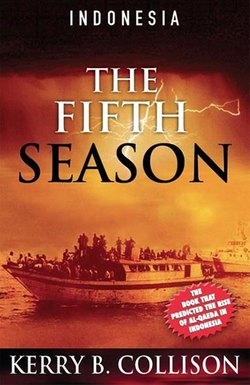Читать книгу The Fifth Season - Kerry B Collison - Страница 5
На сайте Литреса книга снята с продажи.
Postscript 2003
ОглавлениеSubsequent to the events of Bali, Saturday 12 October 2002, I revisited this story and discovered, sadly, that many of the predictions contained in the original edition had come to pass. We have witnessed the emergence of powerful, influential militant Moslem groups, such as the Laskar Jihad and Jemaah Islamiyah , both linked to Osama bin Laden (spelled bin Ladem in The Fifth Season ) and responsible not only for the slaughter of many thousands of Christians in the eastern Indonesian provinces, but the incomprehensible attack on innocent tourists and Balinese which resulted in the loss of so many lives, many of the victims Australian.
It is now an accepted fact that Osama bin Laden and his Al Qaeda had established a sound network throughout Indonesia, parts of Malaysia, and in the southern Philippines, with the intention of supporting the realization of an Islamic state that would embrace all of these nations as one.
Today, in Indonesia, hardly a week goes by without another bombing or news or yet another massacre in Aceh, Maluku, West Papua, the Celebes or Indonesian Borneo, Kalimantan, and, sadly, the burning of mosques in Lombok or the desecration of temples in Bali. Mass graves have recently been discovered containing thousands murdered by the brutal Indonesian Special Forces, whose American trained leadership will, undoubtedly, escape judgment by international tribunals such as those established to prosecute Balkan war criminals.
Over the past two years Australia’s own political landscape has changed, influenced by the threat of a flood of refugees entering its waters via the vast Indonesian archipelago to the north. The Fifth Season’s premise that one day Australia could, as a result of the destabilization of Indonesia, be inundated with a massive wave of refugees seeking asylum is no longer a matter of fiction, but an event which has become inevitable as that great country continues to disintegrate socially, politically and economically.
In 1998, when Indonesia’s political climate became confused, then convulsed violently, many of the Archipelago’s two hundred millions sensed that the long-awaited winds of change carried the elusive promise of reform, and a political shift towards democracy.
Pancaroba, the brief and often erratic time which conjoins the tropical Wet and Dry, is accepted in Equatorial Asia as the Fifth Season, and is known as the transitional climatic period when weather patterns become confused and turbulent.
Often, during these uncertain periods omens become apparent, tempting people whose cultures have been so deeply rooted in mysticism, spiritualism and animism through the millenniums to succumb to even greater superstition than would be their norm.
This is an account based on factual events, and the men and women who struggled to survive the bitter turmoil of Indonesia’s Fifth Season.
